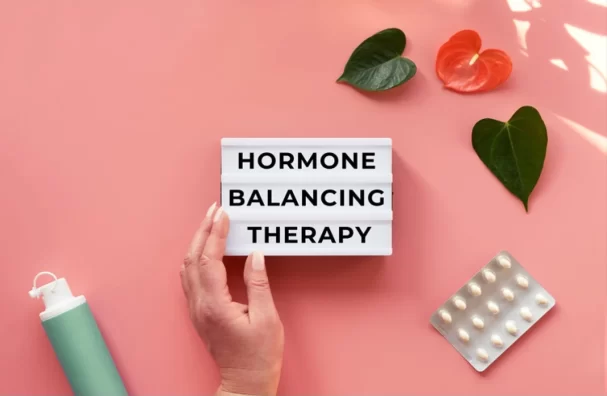
the ever-evolving landscape of women’s health, the topic of hormone therapy for menopause has garnered significant attention and sparked numerous debates. As women navigate this natural transition, understanding the intricacies of hormone replacement therapy (HRT) becomes paramount.
Menopause, a biological milestone in a woman’s life, marks the cessation of menstrual cycles and the end of the reproductive years. During this transition, the body undergoes a complex series of hormonal shifts, often accompanied by a myriad of physical and emotional symptoms. From hot flashes and night sweats to mood swings and sleep disturbances, these manifestations can profoundly impact a woman’s quality of life.
For decades, hormone therapy has been touted as a viable solution for alleviating the discomforts of menopause. The rationale behind this approach lies in the belief that replenishing the declining levels of hormones, primarily estrogen and progesterone, could mitigate the associated symptoms and potentially offer additional health benefits.
However, the efficacy and safety of hormone therapy have been the subject of intense scrutiny and ongoing research, with conflicting findings fueling the debate.
In the early 1990s, observational studies suggested that postmenopausal women who underwent hormone therapy exhibited lower risks of developing coronary heart disease. This led many physicians to prescribe hormone replacement therapy not only for symptom management but also for the purported cardiovascular benefits.
However, the tide began to shift with the groundbreaking Women’s Health Initiative (WHI) study, a large-scale clinical trial that commenced in 1993 and followed over 68,000 postmenopausal women for up to 20 years.
The WHI study’s findings challenged long-held beliefs about the potential benefits of hormone therapy. According to the research, published in the prestigious JAMA journal, women who received conjugated equine estrogens (CEE) experienced only a modest, statistically insignificant decrease in coronary heart disease and myocardial infarction (heart attack) risk compared to those who took a placebo.
Alarmingly, the study also revealed an increased risk of stroke and a higher, albeit not statistically significant, risk of pulmonary embolism among women undergoing hormone therapy.
It’s important to note that current hormone therapy formulations often incorporate lower doses and alternative delivery methods, such as transdermal patches or gels, which may mitigate certain risks associated with oral preparations. Nonetheless, the WHI study’s findings have profoundly influenced medical guidelines and prompted a reassessment of hormone therapy’s role in cardiovascular disease prevention.
While the WHI study cast doubt on the cardiovascular benefits of hormone therapy, it did not negate the potential advantages of this treatment for managing menopausal symptoms. According to experts, hormone therapy remains a viable option for alleviating bothersome vasomotor symptoms, such as hot flashes and night sweats, particularly in women during the early stages of menopause.
Dr. Supreeti Behuria, a cardiologist at Staten Island University Hospital, emphasizes the importance of individualized decision-making: “The decision to start therapy should be made on an individualized basis and should take into account someone’s age as well as their risk for developing heart disease.”
When considering hormone therapy, it is crucial to weigh the potential benefits against the associated risks. Factors such as age, medical history, and the severity of menopausal symptoms should be carefully evaluated in consultation with a healthcare provider.
For women experiencing severe menopausal symptoms that significantly impact their quality of life, hormone therapy may offer relief and improve overall well-being. However, for those with pre-existing conditions or an elevated risk of cardiovascular disease or certain cancers, alternative treatment options may be more appropriate.
While hormone therapy may not be a panacea for cardiovascular disease prevention, maintaining a heart-healthy lifestyle remains essential for postmenopausal women. Dr. Cheng-Han Chen, a board-certified interventional cardiologist, emphasizes the importance of a multifaceted approach: “Eat a heart-healthy diet, get plenty of exercise, maintain a healthy weight, avoid tobacco and alcohol, get good sleep, and watch your blood pressure, blood sugar, and cholesterol levels.”
By adopting these lifestyle modifications, women can proactively reduce their risk of cardiovascular disease and promote overall well-being during and beyond the menopausal transition.
As our understanding of hormone therapy continues to evolve, researchers are exploring new avenues to optimize its safety and efficacy. Dr. Behuria highlights the need for further investigation into the cardiovascular effects of newer hormone therapy formulations, which may yield promising insights and pave the way for more tailored treatment approaches.
In the realm of women’s health, open and honest communication between patients and healthcare providers is paramount. By fostering an environment of trust and transparency, women can make informed decisions about their treatment options, weighing the potential benefits and risks in the context of their individual circumstances.
Ultimately, the journey through menopause is a deeply personal experience, and the decision to pursue hormone therapy should be a collaborative effort between women and their healthcare teams, guided by the latest scientific evidence and a comprehensive understanding of each woman’s unique needs and preferences.
